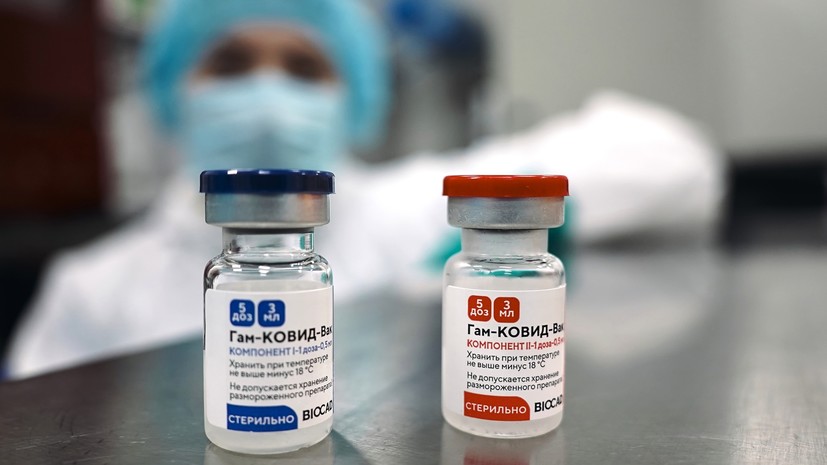Materials began to appear in the Western media, the authors of which highly appreciate the Russian Sputnik V vaccine, designed to combat the coronavirus.
As Bloomberg senior pharmaceutical analyst Sam Fasely noted in his column, Russia ranks fifth in the agency's ranking of vaccine manufacturers with the most pre-orders for the drug.
Fasely recalled the Sputnik V test procedure, during which nearly 23,000 people were vaccinated, of which less than 80 test participants subsequently fell ill.
Along with this, the author of Bloomberg noted, those vaccinated with the Russian drug did not have a severe course of the disease, but the very definition of the severity was not explained, the journalist emphasized.
In addition, Faseli noted the collaboration of Sputnik V developers with the Anglo-Swedish vaccine manufacturer AstraZeneca to create a combination drug.
“Given these facts, even without (published -
RT
) the results of the third phase of the trial, there is reason to think that the Sputnik V vaccine could be as strong a candidate as vaccines created in Western laboratories, which cannot be said about the Chinese vaccine CoronaVac ", - wrote Fazeli.
The journalist cited data according to which the effectiveness of the CoronaVac drug from Sinovac, according to various sources, is in the range from 50% to 90%.
The Russian vaccine, we recall, has demonstrated over 90% effectiveness.
Earlier, The New York Times journalist Andrew Kramer spoke about the benefits of the Sputnik V vaccine.
He said that he had been vaccinated at Moscow polyclinic # 5.
In Russia, as Kramer writes, about a million people have already been vaccinated, and the drug has also been delivered to Belarus, Argentina and a number of other countries.
This, according to the journalist, indicates that "any harmful side effects that were not revealed in the course of research would have already been known by now."
Kramer also noted that Western criticism of Sputnik V is focused on “questionable early drug approval,” but not on how the vaccine is developed, which the journalist writes is similar to that produced by the University of Oxford and AstraZeneca.
He added that "the politicization of the issue of vaccine development" overshadowed the really good test results, which, as Kramer writes, can be called "a genuine achievement of Russian scientists."
Recall that earlier, at different stages of the development of the Russian vaccine against coronavirus, Western media published materials in which the effectiveness and reliability of the drug were questioned.
In particular, publications such as The New York Times, Science Mag, Nature and CNN have made such publications since the end of summer 2020.
Subsequently, the press secretary of the President of Russia Dmitry Peskov spoke about the ambiguous attitude of the West towards the Russian vaccine against coronavirus.
“In the West as a whole, Russia is not in vogue.
Not because it is bad, but because it becomes too good ... Everything is very simple: this is competition, not always fair, ”he was quoted by TASS on the air of the Russia 1 TV channel.
According to Peskov, the release of the world's first Russian vaccine "Sputnik V" posed a "threat from the point of view of competition" for the largest Western manufacturers.
In October 2020, RDIF CEO Kirill Dmitriev also spoke about the accusations against the Russian Sputnik V.
He noted that the West "instead of fighting COVID-19, it is actually fighting the Russian vaccine."
He recalled that "there were accusations that all Russian billionaires were vaccinated, and now they say that people are being forced to do this."
In addition, commenting on the statement about the pressure of the Russian authorities on vaccine developers, the head of the RDIF said that "if there was any political pressure, it is political pressure from the West."
Recall that large-scale vaccination against COVID-19, which started in December 2020, continues in Russia.
To date, the Ministry of Health of the Russian Federation has registered two vaccinations against SARS-CoV-2: the Sputnik V vaccine, developed by specialists from the N.F.
Hamaleas, and the drug "EpiVacCorona" State Research Center of Virology and Biotechnology "Vector".
In late January - early February, registration of the third vaccine is expected, created at the Federal Scientific Center for Research and Development of Immunobiological Preparations named after M.P.
Chumakov RAS.
Meanwhile, Austrian urology professor Bob Javan noted that Sputnik V had no serious side effects.
“It's worth considering this: all vaccines caused side effects.
On the site where the drug was injected, a local reaction appears - rash, redness, swelling.
There is also a general reaction of the body - weakness, headaches.
All of these symptoms indicate that the vaccine is actually working ... However, serious side effects can occur.
If you remember, when testing the BioNTech vaccine, people experienced an anaphylactic reaction, and Moderna's drug caused facial nerve paralysis in some.
Vaccination with Sputnik V was not accompanied by serious adverse reactions.
This drug has been tested and is now being used in Russia, Brazil, Argentina and the United Arab Emirates.
No serious side effects have been reported to date.
Whereas AstraZeneca's vaccine caused spinal cord inflammation in one of the patients.
So vaccines can actually have very serious side effects.
Such cases are observed.
But the analysis of the summarized data and facts suggests that, compared to the total number of vaccinated people, the occurrence of adverse reactions is extremely rare, ”Javan said.
Over the past day, 22,851 new cases of coronavirus have been detected in Russia.
Since the beginning of the pandemic, 3,401,954 cases of COVID-19 have been recorded in the country.
To date, 2,778,889 people have recovered, including 24,080 in the last day.
From complications caused by COVID-19 and related diseases, 61,837 people died.
During the day, the number of deaths increased by 456.
According to Rospotrebnadzor, since the beginning of the pandemic, over 93.5 million laboratory tests have been performed for a new type of coronavirus infection.
627,989 people remain under medical supervision.

